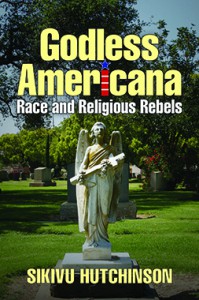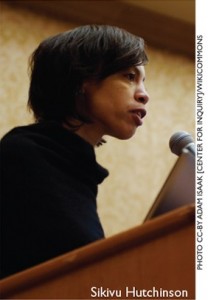Godless Americana: Race and Religious Rebels

Sikivu Hutchinson is an author and activist who promotes a progressive—and aggressive—conception of humanism that is at once feminist, anti-racist, anti-homophobic, anti-classist, and anti-imperialist. She has no patience for nontheists who focus primarily on church/state separation, evolution, and other issues that, in her view, are being promoted particularly by white males within the secular movement. In response, Hutchinson asserts that humanism will only appeal to the masses of “people of color,” women, LGBT individuals, and other historically oppressed groups if it addresses structural and systemic causes of poverty and oppression.
Godless Americana is an impressively researched book that deals with a number of subjects that most nontheists rarely, if ever, discuss at their gatherings or in their literature. For instance, the book makes the case that many white humanists tend to blindly, even proudly, embrace scientism. While noting the importance of science, Hutchinson calls attention to the fact that racism exists in science and in medicine. Moreover, she challenges the notion that black girls aren’t interested in science due to hyper-religiosity. Rather, she states that the contributions of scientists of color are simply not touted in textbooks and lesson plans.
In her hometown of Los Angeles, Hutchinson acknowledges the lack of Advanced Placement (AP) courses for black and Latino high school students. However, students taking these courses are much more likely to earn degrees in hard sciences and engineering. Hutchinson writes:
In 1999, students from the Inglewood Unified School District in Los Angeles successfully sued to get more AP courses at their schools. The suit charged that black and Latino students were systematically denied access to college preparation courses that were standard fare at white schools in Los Angeles County.
In a related story from Bartow, Florida, sixteen-year-old student Kiera Wilmot mixed together toilet bowl cleaner and aluminum foil in a science experiment at her school earlier this year. As a result, there was an explosion. The Bartow Police Department, the Polk County Sheriff’s Office, and Bartow High School pressed two felony charges against her. Feminists and civil rights activists protested vehemently, claiming it was just another example of the cradle-to-prison pipeline that exists for African Americans and society’s failure to encourage black girls to pursue science.
In the area of medicine, blacks have often been used as guinea pigs. The most well-known example is the infamous Tuskegee experiment in which hundreds of black men were allowed to go untreated for syphilis for forty years. For a long time many white skeptics dismissed it as nothing more than a paranoid conspiracy theory. Others have downplayed it or claimed that it was merely an aberration. However, Hutchinson would strongly disagree:
In her book Medical Apartheid, Harriet Washington documents how the field of gynecology developed through experimentation on black female slaves. Black women were used for gruesome experiments that often left them maimed or infertile. In 1852, a white physician named Marion Sims was credited with pioneering the groundbreaking vesicovaginal fistula procedure. Sims’ research, which involved fashioning silver sutures to stabilize the vagina, had been pioneered on the bodies of captive black women.
 Hutchinson cites Washington’s book in pointing out the irony that while this condition (often the result of traumatic childbirth) is most prevalent among poor women in sub-Saharan Africa, they are excluded from benefitting from the surgery made possible by enslaved women of African ancestry.
Hutchinson cites Washington’s book in pointing out the irony that while this condition (often the result of traumatic childbirth) is most prevalent among poor women in sub-Saharan Africa, they are excluded from benefitting from the surgery made possible by enslaved women of African ancestry.
Such are the topics rarely addressed by white nontheists promoting science. Many black people, on the other hand, have come to be distrustful of science and modern medicine largely because of this ugly history. It’s no wonder that so many Africans are attracted to alternative medicine, juju, and so forth, and that so many African Americans won’t visit a physician. Poverty, fear, and desperation often compel people to seek safety and improved health among those who can’t really deliver the goods.
Hutchinson is nothing if not intensely political. It’s refreshing to come across an African-American progressive who has the courage to take Hillary Clinton to task for “pandering to ‘good working white people’ during the 2008 presidential campaign.” Hutchinson goes so far as to call it “racist pandering.” However, to this day most African Americans still fawn all over the Clintons. If Hillary Clinton decides to run for President in 2016, she will no doubt garner much of the black vote.
As a feminist, Hutchinson asserts that black women are far more stigmatized and oppressed than their white counterparts. She writes of white feminists trying to reclaim the word “slut” as a badge of honor and proud hypersexual identity in “Slut Walk” campaigns: “…the worst white female ‘slut’ (from bad mothers like Casey Anthony to bad slut entertainers like Madonna, Lady Gaga and the list goes on) is significantly more valued in American culture than the most virtuous black woman could ever be.”
Though men have thoroughly objectified white women, Hutchinson contends that white women are still the gold standard of beauty, femininity, womanhood, desirability, and so on. This is most evident, she writes, in the value that the mainstream media place upon missing white girls and white women, and other white female crime victims, such as Chandra Levy, Natalee Holloway, and others. Conversely, black girls and black women in the same dire circumstances get scant attention, or no attention at all.
Hutchinson even criticizes one of the leading female voices in the secular movement (Susan Jacoby) in her discussion of how white women owned and mistreated slaves and have benefitted from white supremacy in many ways: “Jacoby lauds Elizabeth Cady Stanton for her secular feminist activism yet makes only passing reference to her infamous racist denigration of men of color and immigrant men.”
The exaltation of secular figures such as Thomas Jefferson who were thoroughly racist slave owners has long been a problem among white humanists. Why should black people be expected to relate to those who held their ancestors in bondage or who aided and abetted the oppression of their people in numerous ways? Hutchinson also notes that white women from a group called Restore Our Alienated Rights (ROAR) led the racist anti-busing campaign in Boston in the 1970s—supposedly in the name of feminism. White women leading the Home and School Association (a Boston PTA-like organization) also gave a “feminist bent” to the anti-busing movement. For these reasons and others, Hutchinson concludes that “sisterhood” is “not inherently global,” contrary to what many white feminists believe.
The author also discusses important historical changes in the African-American community. For example, as in all communities, a trip to prison for committing a crime used to be a source of embarrassment. However, in the black community today, hardcore hip-hop glorifies the prison life, young men on the streets dress like prisoners, and so on. In the 2003 documentary Tupac: Resurrection, the late rapper Tupac Shakur states, “I couldn’t wait to go to jail.” It’s as though he’s discussing an upcoming trip to the Super Bowl. Moreover, many girls and women are attracted to violent criminals. What the world greatly needs is a strong feminist critique of this mindset.
For those who wonder what any of these issues have to do with the humanist movement, Hutchinson would surely want to know how any them could not be considered humanist issues. Godless Americana is an incredibly provocative book, containing something to infuriate practically anyone who reads it. And I suspect that the author wouldn’t have it any other way.![]()
